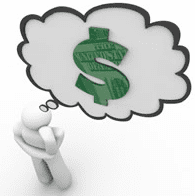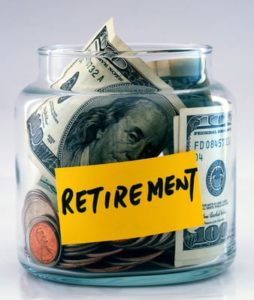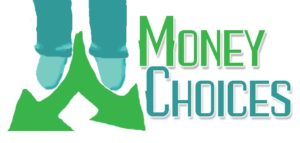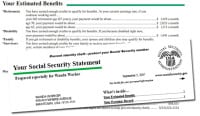 Now what about retirement? Are you on track? It’s never too early to start to save for retirement as you have the power of time. On the other hand, it’s never too late to start either. Sign up for your company’s retirement plan. You don’t want to pass up free matching funds. If that is not available, open your own retirement account and automate your contributions. Start today. #JillRussoFoster #FinancialLiteracyMonth
Now what about retirement? Are you on track? It’s never too early to start to save for retirement as you have the power of time. On the other hand, it’s never too late to start either. Sign up for your company’s retirement plan. You don’t want to pass up free matching funds. If that is not available, open your own retirement account and automate your contributions. Start today. #JillRussoFoster #FinancialLiteracyMonth
Are you curious about when to start social security?

That’s a question on a lot of people’s minds. Should I take it early at 62 or at my full retirement age or wait until I am 70.
Well wouldn’t it be great if you had a crystal ball to get the right answer for you. Well, we don’t and you want to make the right decision for your situation.
Here is an article from the Motley Fool that could give you some information that may help you make a decision that’s right for you.
It’s Never Too Late
Welcome to 2022!
It’s time to think about your finances. What are your financial goals for the upcoming year? Are you looking to save for an emergency fund, retirement, a new home or home improvements, education, an emergency fund?
There is so much to accomplish and never enough money. Well, that is how I used to think. But not anymore. 
I started by taking small steps to achieve my financial goals. My first goal was to create an emergency fund of $5,000. Sounds overwhelming, but I broke it down into small steps:
$5,000 in one year is $416.66 a month – $5,000 in one year is $96.15 a week – $5,000 in one year is $13.70 a day
Next, I needed to find this money in my budget. What could I cut back on or do without? It turns out it was multiple ideas to come up with this money. We spaced out haircuts, we stopped buying beverages for work (we bring our own), we trim our dog’s nails ourselves and more.
Lastly, we automated the savings. Each paycheck we save $100.00 into our emergency savings automatically. It’s set and done.
Now we have the emergency fund we need to be prepared for whatever happens in our life.
Please know that it’s never too late to start to save for your goal. Obviously, the earlier you start the better off you are. But not starting is a mistake. Make a plan and decide to start now. You too can achieve your financial goals this year.
Are You Losing Money?
Many companies offer their employees free matching funds for their retirement. According to CNBC, 17.5 million Americans leave this free retirement money on the table. Is this you? 
401K retirement account contributions are pre-tax, therefore lowering your taxable income. CNBC says that 17% of employees don’t contribute. Why not? Many people say they don’t have the funds to contribute to their retirement. Among those that do contribute, 12% don’t get the full matching funds.
When I worked at Norwalk Community College, one of the first things I did was read the entire employee manual. Yes, it was long, but it had valuable information that I could take advantage of. I chose the alternate retirement plan. For me that meant, I would have to contribute 5% of my gross income to receive the matching funds. As soon as I was eligible, I enrolled. In this particular plan, I was given 8% matching funds. Why wouldn’t I do this? For me, this was a no brainer. I have always accepted free money.
If you have accepted your free money, congratulate yourself. If not, enroll today (or as soon as you are eligible). You don’t want to pass up free money.
Things To Do Before You Retire
 Whether you are just starting out or nearing retirement, there are things you can do now to make retirement easier for you. You don’t want to retire and not have the money to do what you want. Here are some things you should think about:
Whether you are just starting out or nearing retirement, there are things you can do now to make retirement easier for you. You don’t want to retire and not have the money to do what you want. Here are some things you should think about:
- Do you have enough in your emergency fund? This past year many people were laid off, furloughed and/or unemployed. An emergency fund helped many get by. These funds will help you with an unexpected need for funds i.e. fridge dies and needs to be replaced, your car breaks down and you need to rent a replacement car, etc. Life happens whether or not you have the funds. Create or increase your emergency fund to cover 6 to 12 months of your expenses.
- Have you maxed out your retirement contributions? You may want to fund your retirement accounts both through your employer (401K, 403B, 457, etc.) and your personal (IRA and Roth) accounts. You can never have too much money for retirement.
- Is your budget balanced? One of the biggest mistakes you can make is to have more expenses than income. If this is the case, you will be accumulating debt and therefore not savings money. Eventually, this could snowball and you will be a slave to your debt. Make changes now to live within your means.
- Is your debt paid off in full? Just like living within your means, having your debt paid off in full is important. When you retire, you will be living on less income. Having debt paid off will help you living within your means. Make a plan to have your debt paid off.
According to AARP, more than half of the full-time workers age 50 years and above will lose their job involuntarily. Keep track of your finances, live below your means and be prepared for whatever comes your way.
Your Financial Health
Do you ever wonder how your financial pictures stacks up? Are you on track to meet your goals? What do you need to still do? These and other questions are always on the man y people’s minds.
y people’s minds.
I have discussed the importance of having an emergency savings, a budget to know where your money is going, great credit /score to have the best interest rates when you need to borrow and minimal high interest debt. Check out some of my past emails for more information on these topics.
This is a great article Six Numbers Reveal the State of Your Financial Health. How well do your finances compare to these six areas? All are important areas that should be goals for you to accomplish with your finances.
Are You Nearing Retirement?
 No (or minimal) retirement savings! If you are getting up there closer to retirement, this can be a scary thing.
No (or minimal) retirement savings! If you are getting up there closer to retirement, this can be a scary thing.
Suze Orman wrote this great article, that there can be hope and it’s not too late to start or catch up on retirement savings. Help! I’m 55 and Have No Nest Egg
You can do anything you set a goal to do.
Have You Checked This Lately?
Every year around my birthday is the time I check my social security.
No, I am not ready to apply. But it’s something I do annually to make sure all is correct. Every year socia l security posts your income to your account (the same income you file on your federal tax return). I like to double check to make sure mine is correct. It’s much easier for me to check now, then to figure it out when I apply for social security down the road. My records are easily accessible and easy to review to double check.
l security posts your income to your account (the same income you file on your federal tax return). I like to double check to make sure mine is correct. It’s much easier for me to check now, then to figure it out when I apply for social security down the road. My records are easily accessible and easy to review to double check.
When was the last time you looked at your social security account?
Investing In Your Future
It’s never too late to invest in your future. Whether you are starting out now or picking up where you left off, make a plan.
 Real Simple Magazine has information on investing from $5.00 to $50,000. A new year and it’s time to invest in your future.
Real Simple Magazine has information on investing from $5.00 to $50,000. A new year and it’s time to invest in your future.
Thinking about retirement
As we get older one of the things that is always on my mind is retirement. What does it look like for me? Where do I want to live – stay where I am or move? Stay in my current house or downsize (maybe condo)? The list of questions goes on and on for me.
Wallet Hub has come out with a list of 2018 Best and Worst States to Retire To. Where is your state? This might be something to take into consideration in your planning.